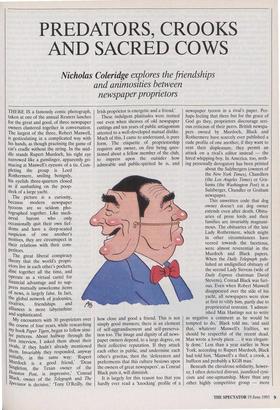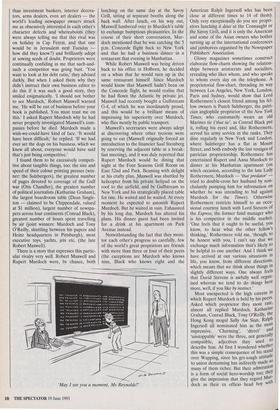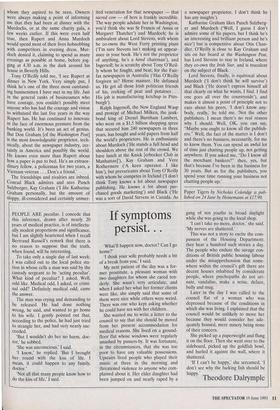PREDATORS, CROOKS AND SACRED COWS
Nicholas Coleridge explores the friendships
and animosities between newspaper proprietors
THERE IS a famously comic photograph, taken at one of the annual Reuters lunches for the great and good, of three newspaper owners clustered together in conversation. The largest of the three, Robert Maxwell, is gesticulating in a complicated way with his hands, as though practising the game of cat's cradle without the string. In the mid- dle stands Rupert Murdoch, his right eye narrowed like a gunslinger, apparently gri- macing at Maxwell's eyesore of a tie. Com- pleting the group is Lord Rothermere, smiling benignly, his eyelids three-quarters closed as if sunbathing on the poop- deck of a large yacht.
The picture is a curiosity, because modern newspaper tycoons are so seldom pho- tographed together. Like medi- aeval barons who only occasionally quit their own fief- doms and have a deep-seated suspicion of one another's motives, they are circumspect in their relations with their com- petitors.
The great liberal conspiracy theory that the world's propri- etors live in each other's pockets, dine together all the time, and operate as a virtual cartel for financial advantage and to sup- press mutually unwelcome items of news, is largely false. In fact, the global network of jealousies,
rivalries, friendships and alliances is more labyrinthine and sophisticated.
My encounters with 30 proprietors over the course of four years, while researching my book Paper Tigers, began to follow simi- lar patterns. About halfway through the first interview, I asked them about their rivals, if they hadn't already mentioned them. Invariably they responded, anyway Initially, in the same way: 'Rupert Murdoch is a good friend,' Dean Singleton, the Texan owner of the Houston Post, is impressive,' Conrad Slack, owner of the Telegraph and The Spectator is decisive,' Tony O'Reilly, the
Irish proprietor is energetic and a friend.' These indulgent platitudes were trotted out even when sheaves of old newspaper cuttings and ten years of public antagonism attested to a well-developed mutual dislike. Much of this, I came to understand, is pure form. The etiquette of proprietorship requires any owner, on first being ques- tioned about a fellow member of the club, to impress upon the outsider how admirable and public-spirited he is, and how close and good a friend. This is not simply good manners; there is an element of self-aggrandisement and self-preserva- tion too. The image and dignity of all news- paper owners depend, to a large degree, on their collective reputation. If they attack each other in public, and undermine each other's gravitas, then the `deferences and preferments that this culture bestows upon the owners of great newspapers', as Conrad Black puts it, will diminish.
It is largely for this reason too that you hardly ever read a 'knocking' profile of a
newspaper tycoon in a rival's paper. Per- haps feeling that there but for the grace of God go they, proprietors discourage seri- ous criticism of their peers. British newspa- pers owned by Murdoch, Black and Rothermere have scarcely ever published a rude profile of one another; if they want to vent their displeasure, they permit an attack on a rival's editor instead — the hired whipping-boy. In America, too, noth- ing personally derogatory has been printed about the Sulzbergers (owners of the New York Times), Chandlers (the Los Angeles Times) or Gra- hams (the Washington Post) in a Sulzberger, Chandler or Graham newspaper.
This unwritten code that dog owner doesn't eat dog owner extends even after death. Obitu- aries of press lords and their families are invariably magnani- mous. The obituaries of the late Lady Rothermere, which might in other circumstances have veered towards the facetious, were almost reverential in the Murdoch and Black papers. When the Daily Telegraph pub- lished an undignified obituary of the second Lady Stevens (wife of Daily Express chairman David Stevens), Conrad Black was furi- ous. Even when Robert Maxwell disappeared over the side of his yacht, all newspapers were slow at first to vilify him, partly due to proprietorial restraint. 'I admon- ished Max Hastings not to write as negative a comment as he would he tempted to do,' Black told me, 'and said that, whatever Maxwell's frailties, we should be respectful of the recent dead. Max wrote a lovely piece. . . it was elegant- ly done.' Less than a year earlier in New York, according to Rupert Murdoch, Black had told him, 'Maxwell's a thief, a crook, a buffoon and probably a KGB man.'
Beneath the chivalrous solidarity, howev- er, I often detected distrust, jaundiced cyni- cism and one-upmanship. More than any other highly competitive group — more than investment bankers, interior decora- tors, arms dealers, even art dealers — the world's leading newspaper owners struck me as obsessively interested in each other's character defects and whereabouts (they were always telling me that this rival was on holiday in Cap Ferrat, and that one would be in Jerusalem next Tuesday how did they know?) and brilliantly adept at sowing seeds of doubt. Proprietors were continually confiding in me that such-and- such a competitor was going bust. 'You want to look at his debt ratio,' they advised darkly. But when I asked them why they didn't instruct their own business editor to do this if it was such a good story, they smiled enigmatically. 'I should not bother to see Murdoch,' Robert Maxwell warned me. 'He will be out of business before your book is published. You must trust me on this.' I asked Rupert Murdoch why he had never properly investigated Maxwell's com- panies before he died. Murdoch made a wish-we-could-have kind of face. 'It would have been difficult,' he replied. 'If we had ever set the dogs on his business, which we knew all about, everyone would have said that's just being competitive.'
I found them to be excessively competi- tive about tangible things, too: the size and speed of their colour printing presses (win- ner: the Sulzbergers), the greatest number of pages devoted to coverage of the Gulf war (Otis Chandler), the greatest number of political journalists (Katharine Graham), the largest boardroom table (Dean Single- ton — claimed to be Chippendale, valued at $1 million), largest number of newspa- pers across four continents (Conrad Black), greatest number of hours spent travelling by air (joint winners: Murdoch and Tony O'Reilly, shuttling between his papers and Heinz headquarters in Pittsburgh), most executive toys, yachts, jets etc. (the late Robert Maxwell).
There is a story that expresses this partic- ular rivalry very well. Robert Maxwell and Rupert Murdoch were, by chance, both lunching on the same day at the Savoy Grill, sitting at separate booths along the back wall. After lunch, on his way out, Maxwell lumbered over to Murdoch's table to exchange bumptious pleasantries. In the course of their short conversation, Mur- doch mentioned that he was catching the 5 p.m. Concorde flight back to New York and that he had a business dinner in a restaurant that evening in Manhattan.
While Robert Maxwell was being driven back to his office in Holborn, he decided on a whim that he would turn up in the same restaurant himself. Since Murdoch would know that Maxwell hadn't been on the Concorde flight, he would realise that he had flown the Atlantic by private jet. Maxwell had recently bought a Gulfstream G-4, of which he was inordinately proud, and this would be a brilliant means of impressing his superiority over Murdoch, who flies mostly by public transport.
Maxwell's secretaries were always adept at discovering where other tycoons were going to eat (Maxwell originally forced an introduction to the financier Saul Steinberg by reserving the adjacent table at a break- fast meeting), and it was duly reported that Rupert Murdoch would be dining that night at the Four Seasons Grill Room on East 52nd and Park. Beaming with delight at his crafty plan, Maxwell was shuttled by helicopter from his private helipad on the roof to the airfield, and by Gulfstream to New York and his strategically placed table for one. He waited and he waited. At every moment he expected to astonish Rupert Murdoch. But he waited in vain. Exhausted by his long day, Murdoch has altered his plans. His dinner guest had been invited for a drink at his apartment on Park Avenue instead.
Notwithstanding the fact that they moni- tor each other's progress so carefully, few of the world's great proprietors are friends with more than three or four of their peers (the exceptions are Murdoch who knows nine, Black who knows eight and the 'May I see you a moment, Ms Reynolds?' American Ralph Ingersoll who has been close at different times to 14 of them). Only very exceptionally do you see propri- etors lunching a deux at the Connaught or the Savoy Grill, and it is only the American and some of the Asian owners who bother turning up at the international conferences and jamborees organised by the Newspaper Publishers' Association.
Glossy magazines sometimes construct elaborate flow-charts showing the relation- ships between aristocrats and socialites, revealing who likes whom, and who speaks to whom every day on the telephone. A proprietorial flow-chart, threading its way between Los Angeles, New York, London, Paris and Sydney, would show that Lord Rothermere's closest friend among his fel- low owners is Punch Sulzberger, the patri- cian anglophile proprietor of the New York Times, who customarily wears an old Marines tie (`that tie', as Conrad Black put it, rolling his eyes) and, like Rothermere, served his army service in the ranks. They dine regularly in New York and London, where Sulzberger has a flat in Mount Street, and both embody the last vestiges of patrician proprietorship. Rothermere has entertained Rupert and Anna Murdoch to dinner at his Manhattan apartment (on which occasion, according to the late Lady Rothermere, Murdoch — 'that predator' tried to double-cross her husband by non- chalantly pumping him for information on whether he was intending to bid against Murdoch for the Times). Otherwise Rothermere restricts himself to an occa- sional courtesy lunch with Lord Stevens of the Express, the former fund manager who is his competitor in the middle market. 'One feels that it ought to be useful, you know, to hear what the other fellow's thinking,' Rothermere told me, 'though, to be honest with you, I can't say that we exchange much information that's likely to be helpful to one another. And I think we have arrived at our various situations in life, you know, from different directions, which means that we think about things in slightly different ways. One always feels that David Stevens is awfully well organ- ised whereas we tend to do things here more, well, if you like by instinct.' Most unexpected is the high esteem in which Rupert Murdoch is held by his peers. Asked which proprietor they most rate, almost all replied Murdoch. Katharine Graham, Conrad Black, Tony O'Reilly, the Hong Kong mogul Sally Aw Sian, Ralph Ingersoll all nominated him as the most impressive. 'Charming', 'direct' and 'unstoppable' were the three, not generally compatible, adjectives they used to describe him. At first I wondered whether this was a simple consequence of his stand over Wapping, since his get-tough attitude to union demanning has indirectly made s° many of them richer. But their admiration is a form of social hero-worship too; they give the impression that they regard Mur- doch as their ex officio head boy wit" . whom they aspired to be seen. Owners were always making a point of informing me that they had been at dinner with the Murdochs, or at the same charity gala, a few weeks earlier. If this were even half true, then Rupert and Anna Murdoch would spend most of their lives hobnobbing with competitors in evening dress. Mur- doch denied it, claiming to spend as many evenings as possible at home, before jog- ging at 4.30 a.m. in the dark around his house in Beverly Hills.
Tony O'Reilly told me, `I see Rupert at dinner in New York. Very simply put, I think he's one of the three most outstand- ing businessmen I have met in my life. Just in the general ranks of businessmen who have courage, you couldn't possibly meet anyone who has had the courage and vision to withstand the last five years in the way Rupert has. He has continued to innovate in the face of enormous pressure from the banking world. It's been an act of genius. But Don Graham [of the Washington Post] is the most knowledgeable proprietor, tech- nically, about the newspaper industry, cer- tainly in America and possibly the world. He knows even more than Rupert about how a paper is put to bed. He's an extraor- dinary fellow, a policeman for two years, a Vietnam veteran . . Don's a friend.'
The friendships and rivalries are inbred. Conrad Black admires and sees Punch Sulzberger, Kay Graham CI like Katharine Graham personally, but the amount of sloppy, ill-considered and certainly unmer- ited veneration for that newspaper — that sacred cow — of hers is frankly incredible. The way people adulate her in Washington, you'd think she was St Francis of Assisi or Margaret Thatcher') and Murdoch; he is ambivalent about Lord Stevens, with whom he co-owns the West Ferry printing plant (`I'm sure Stevens isn't making an appear- ance in your book. He's not the proprietor of anything, he's a hired chairman'), and Ingersoll; he is scratchy about Tony O'Reil- ly whom he fought, and beat, for the Fair- fax newspapers in Australia (`Has O'Reilly forgiven us? Horse manure. He defamed us. He got all those Irish politician friends of his, reeking of peat and potatoes . . His job is manufacturing ketchup in Pitts- burgh').
Ralph Ingersoll, the New England Wasp and protégé of Michael Milken, the junk- bond king of Drexel Burnham Lambert, who went on a $1.5 billion shopping spree that secured him 240 newspapers in three years, has bought and sold papers from half the world's proprietors. He is enthusiastic about Murdoch (`He stands a full head and shoulders above the rest of the crowd. We have lunch at the Knick [erbocker Club in Manhattan]'), Kay Graham and Vere Rothermere CA keen operator. I like him'), but prevaricates about Tony O'Reilly with whom he competes in Ireland CI don't think Tony knows a lot about newspaper publishing. He knows a lot about pur- chased goods marketing') and Black (`He was a sort of David Stevens in Canada. As a newspaper proprietor, I don't think he has any insights').
Katharine Graham likes Punch Sulzberg- er and Murdoch ('Well, I guess I don't admire some of his papers, but I think he's an interesting and brilliant person and he's nice') but is competitive about Otis Chan- dler. O'Reilly is close to Kay Graham and sits on her board at the Washington Post, has Lord Stevens to stay in Ireland, where they co-own the Irish Star, and is truculent on the subject of Black.
Lord Stevens, finally, is equivocal about Murdoch CI don't think he will survive') and Black (`He doesn't express himself all that clearly on what he wants, I find. I find one goes all over the countryside'), and makes it almost a point of principle not to care about his peers. 'I don't know any- body, really,' he told me. 'Not the other publishers. I mean there's no real reason why I should. Well, OK, you can say, "Maybe you ought to know all the publish- ers." Well, the fact of the matter is I don't and there's no business, necessarily, for me to know them. You can spend an awful lot of time just chatting people up, not getting anywhere. If you asked me, "Do I know all the merchant bankers?" then, yes, but that's because I've been in the business for 30 years. But as for the publishers, you spend your time running your business not chatting people up.'
Paper Tigers by Nicholas Coleridge is pub- lished on 24 June by Heinemann at £1 Z99.




















































 Previous page
Previous page